- Home
- Rudy Rucker
As Above, So Below Page 26
As Above, So Below Read online
Page 26
“She has a pretty daughter with a sweet figure,” said the lively Princess.
“Young Mayken,” said Bruegel. Basking in the nobles’ attention, he decided to push himself forward a bit. “I’m more than fond of her.”
“You’re not the only one,” said Princess Anna with a caustic shriek of laughter.
Bruegel’s stomach went hollow. It was as he’d feared! He had a rival! “How do you mean, Your Highness?” he asked, struggling to keep a calm face.
Princess Anna nudged one of her ladies-in-waiting and said something to her in High German, too rapidly for Bruegel to understand.
“Don’t torment him with your gossip, Anna,” interrupted William. “Take away his picture now, will you?” I feed roses to pigs, thought Bruegel, watching one of the Princess’s ladies carry off his painting to who knew where. Six months out of his life, and William and his wife might never look at it again. How selfish and idle were the nobles. Waf was nosing at the edge of the table, trying to get a good scent of the food. It struck Bruegel that in some sense he was doing the same thing here himself. Sniffing at the edge of the table.
“Where are you staying in Brussels, Peter?” asked William, taking a scrap of clove-scented gristle from off his plate and giving it to the dog.
“In an inn,” said Bruegel, feeling numb from Princess Anna’s news. “Eventually I hope to move—” He stopped himself, not wanting to mention his hopes to this worldly, mocking company. He started over. “I hope to rent a large room.”
“I own some buildings in the Marolles,” said William in a friendly tone. “Talk to Groelsch, my purser, and he’ll find you a sunny loft at a reasonable rate. That’s him down there bent over his plate. Be a bit cautious when you interrupt his feeding. Farewell, then. Come visit again when I’ve fewer guests. I’ll show you my collection. Remember that I have a masterpiece by Bosch. It’s called The Garden of Earthly Delights.” Grauer shifted, and now William looked over Bruegel’s shoulder at a new arrival. “Ah, Brederode, here you are. I’ll send the steward for more wine.”
Egmont became immediately absorbed in discussing some point of governance with Brederode, and ignored Bruegel’s dismissal. But de Hoorne gave him a friendly nod. Bruegel spoke with Groelsch about his need for a studio, and left the hall with Waf. He felt himself every bit the impoverished, overworked, disinherited, and unmarriageable peasant.
In the palace courtyard, Bengt Bots, the falconer’s son, came dashing after Bruegel, his colorless hair flopping as he ran. Though it was cold, the boy hadn’t paused to put on a coat; he was dressed in brown breeches and a loose red jerkin. His blue eyes were shining with excitement and his pale cheeks were flushed. He was carrying a roll of papers in his hand.
“Master Bruegel! I was upstairs when they carried up your new painting. Are you going to live in Brussels now?”
“I am.” The youth’s joy at seeing him was balm to Bruegel’s soul. “How are the falcons?”
“Cruel and greedy as ever.” The boy paused to catch his breath, his eyes searching Bruegel’s face. “Master Bruegel, everyone says I draw very well, and I was wondering—could I be your apprentice?”
The unexpected request brought Bruegel back to the day when he’d first approached Master Coecke with the same question. It was after Bruegel had run away from the school and found his way to Antwerp, the city of artists, and there he’d ended up on Master Coecke’s doorstep, hat in hand, begging to be taken on as an apprentice. And now he said to Bengt what Master Coecke had said to him then.
“You seem a likely lad, but it costs money to be my apprentice. People don’t value what they get for free.”
“I don’t have any money,” said young Bengt. “And my father only wants me to be a falconer. But, here, look at this.”
And just as Bruegel had done with Coecke, Bengt Bots handed over a roll of papers covered with drawings of people and animals. A November breeze rattled the papers as Bruegel looked through them. The years were moving on, and it was really time he had an apprentice. Perhaps there was a way. If the boy’s skill was only moderate, he definitely liked to draw. There were dozens, no scores, of scenes of falconry and palace life. Young Bengt had the most important trait, the obsession to draw what he saw.
“I’d like to have you,” said Bruegel, handing the papers back to Bengt and patting him on the shoulder. “You have it in you to be an artist, Bengt. I wonder if Prince William would help you with the apprenticeship fee.” In his own case, it had been old Graaf de Hoorne who came up with the money. It was striking how the world liked to repeat itself. Like some vast and intricate clock. “But there’s no great urgency to sign on with me,” he continued. “I don’t have a proper studio yet.”
“Thank you, Master Bruegel,” said Bengt ardently. “Thank you.” He brushed his pale shock of hair back from his eyes. “Are you still planning to marry Mayken?”
“Did I tell you that?” asked Bruegel, back on his guard.
“You hinted,” said Bengt. “I saw her here again the other day. She’s so pretty. You should get her before someone else does.”
“Is anyone else after her?” asked Bruegel, a little ashamed to be lowering himself to this level with the boy.
“I wouldn’t know,” said Bengt, his pale face unreadable. Evidently he did know something, but he didn’t want to say. A damp gust of wind buffeted them.
I’ve heard more than enough unpleasant mystery mongering for today, thought Bruegel. “Come see me in a few months,” he said, sourly closing off the conversation. “And see if Prince William will pay your fee. I truly won’t take you on without it.”
The next few weeks passed quickly. Groelsch rented Bruegel a good loft above a candle shop on the Hoogstraat. just a block and a half from the Coecke house. Using the money Jonghelinck had advanced him, Bruegel set up a studio and some spartan living arrangements. The Tower of Babel was clear in his mind from the miniature of it he’d painted years ago in Rome, and the work went quickly. In Mechelen he’d grown used to working on more than one picture at once, so he went ahead and started a second version of the Tower. The large one would be for Jonghelinck, and the small one for himself—or for Mayken.
Ah, Mayken. Try as he might to lose himself in his work, Bruegel was desperately in love with the girl. No longer was it the family workshop, the four-story brick house, or the solid social standing that he sought. It was young Mayken herself—the frisky rhythms of her walk, the cheerful clamor of her voice, the special tang of her breath, the pinks and yellows of her skin, the glowing warmth of her face, and the wise, funny, unexpected things she said. Bruegel wanted to live with her, to swell her with children, to care for her and love her for the rest of his days.
But the situation remained unsettled. Mayken refused to give a yes or no to his proposals, always saying she needed more time. It made Bruegel feel old and ugly to badger her. A growing sense of despair flooded around him like a swamp.
At least old Mayken was still his ally. She and Bruegel had any number of whispered conferences at her front door. She reported that her daughter was still going out on her own most afternoons. Bruegel went to mass a few times to look for her, but she wasn’t there. He considered following her, but decided it would be too absurd and ignoble. Better to wait, and if Mayken wouldn’t have him, well then, life would have to go on. Meanwhile there was nothing to do but paint.
It was mid morning of a rainy day in late November when Williblad Cheroo appeared in Bruegel’s studio, well turned out as usual, this time in soft black leather, a white silk shirt, and a cloak and hat trimmed with white fur. His tall boots had silver buckles. His cloak dripped a little puddle onto Bruegel’s floor.
“Don’t attack me with your paintbrush again,” said Cheroo, not quite smiling. Waf had started barking when Cheroo came in, but now the dog recognized the tall half-American and lay back down.
“I’d heard you moved to Brussels,” said Bruegel, prepared to be civil. He remembered Ortelius’s remark that Bruegel
and Williblad should be friends. “Who are you working for?”
“An old patron of yours,” said Cheroo. “He’d like another picture by you.”
“Pleasant news,” said Bruegel. “Have a seat. Which patron do you mean?”
“Cardinal Granvelle,” said Cheroo, still standing. “He’d like something inoffensive this time. A simple river landscape with a biblical scene.”
“Granvelle!” exclaimed Bruegel. Though he knew the Cardinal lived in Brussels, Bruegel hadn’t seen Granvelle yet, and that had seemed for the best. At their last meeting, Granvelle had been so very hostile. Though Bruegel had indeed stayed in exile for the prescribed six months, who knew but that Granvelle might suddenly choose to punish him some more. Yet now here was Williblad with a fresh commission from the man. So be it.
Bruegel always had a few ideas for new pictures in his head. The constant churning of his life seemed to unearth the ideas quite unbidden. He now proposed the one that seemed likeliest to fit Granvelle’s request. “A Flight into Egypt,” said Bruegel. “Joseph in the foreground on a hill crest, leading Mary into—into who knows what. The future. A dark gully. And a great landscape spreading out beyond that.” Speaking of the picture, he realized it would be an image of him and Mayken. He made a little sketch of it on a piece of paper as he talked. “So it’s Granvelle you’re working for, eh? No wonder you didn’t want to tell anyone in Antwerp. Even your friend Ortelius didn’t seem to know. Well, I’m in no position to chide you. I’ve worked for him before and now it seems I’ll work for him again.” He handed the sketch to Cheroo. “Do you think a Flight into Egypt will suit?”
“Indeed,” said Cheroo, pocketing the paper after a cursory glance. “Let’s work out the figures.” They’d soon settled this, with a better payment than Bruegel had hoped for. But instead of leaving, Cheroo walked over to Bruegel’s window and stared out through the rain.
“Mayken Coecke’s house is just down the road,” he said presently. “I can see it.”
“That’s right,” said Bruegel uneasily. A spasm of pain shot through his stomach. Cheroo had made free with his Anja. Oh God. Could it be that—
“Young Mayken’s very impressionable,” said Cheroo. “A word from me and she’d let you marry her.”
This was worse than anything Bruegel had feared. He took an uncertain step towards Williblad. The older man placed one hand inside his cloak, and his voice took on a warning tone. “Don’t rush at me, Peter. I have a knife and I know how to use it. Hear me out. Don’t try and wrestle with me like a peasant boy.”
“You’ve seduced her?” groaned Bruegel. His knees felt weak. He felt like throwing up.
“Granvelle sent me to her house to discuss a tapestry. I followed her to mass the next day, and now most afternoons we walk in the park. She likes hearing about America. About the egrets and the alligators.”
“What do you want from the poor girl?” cried Bruegel in anguish. “If you have an honest marriage proposal, and if she prefers you, well then, I’ll step aside. But—walking in the park? What park do you mean?”
“Granvelle’s estate’s not so far from here. It’s commodious and private. On the rainy days we might sit in his library.”
Bruegel groaned again. “Granvelle put you up to this, didn’t he? He hasn’t forgiven me for the lampoon and for the Dulle Griet.”
“There’s more to life than paintings, Peter,” said Cheroo with a dismissive gesture. “Dulle Griet is forgotten, and the Flight into Egypt is but a pretext for us to talk. Politics are what interest the Primate. Connections and introductions. Granvelle deputized me to pluck your Mayken so that I could ask a special favor from you.”
Bruegel would have lunged at Cheroo now, but, anticipating this, the tall, experienced man had drawn out his knife. Bruegel sat down on the edge of his bed, his stomach a filigree of pain. Sensing his master’s distress, Waf walked over and sniffed at him. Distractedly Bruegel petted Waf’s thick white coat. He felt weak and stupid and beaten.
Blearily he thought of Mayken’s bright, kissable face. If Williblad kept up his game with her, she’d suffer greatly. The gossip, an unwed pregnancy, a full-blown scandal—her reputation would be ruined. “What do you and Granvelle want from me?” he asked Williblad finally. “I’ll do what you say.”
“Very good,” gloated Cheroo. “I’m satisfied to see you so humble. It’s a fine bit of revenge for our business at the Landjuweel, when you made the others laugh at me. Even though you’re an artist, you’re no better than me, you see?” The very fact that Williblad had to say this gave the lie to it. The man’s inner weakness gave Bruegel a bit of badly needed strength. “I’m about done with Mayken in any case,” continued Williblad. “I’d rather not see her cast out of society, better she ends up settled with you. She feels bad about her deceit, you know. I’ve had to dry many of her tears. Now keep your temper, Peter! Yes, I’ll break off with Mayken if you’ll do the one small favor for the Cardinal.”
Something odd was happening in Bruegel’s head. The room had stopped looking real; it had started looking like a painting. Tall dark Cheroo, the bright window with the gray sky, the uneven grimy boards of the floor, the peeling plaster on the walls, the convex mirror, some combs of beeswax in the corner, the pots and bowls of paint, the two panels of the Tower of Babel, the bed, and he himself upon it with the dog at his side—all of it was colors and shapes. There were three people in the picture: Bruegel and Williblad with their tangled histories, and somehow Mayken in the room as well, perched pale and alert to one side, invisibly watching them. They were like three trees with twisting trunks, their past and present in the picture’s eternal Now.
“Did you hear me?” Cheroo was saying querulously.
“What?”
“You’re to take on one of Granvelle’s countrymen as an apprentice. Just for a month. The Cardinal himself will pay the fellow’s apprenticeship fee, and after a month you’re free to let him go.”
“A Frenchman?”
“A French-speaking Walloon from the province of Luxembourg. His name is Lazare. I believe he’s Granvelle’s great-nephew. He’s interested in the arts; he wants to have the experience of associating with you and your clients.”
“Yet he’s not an artist himself,” said Bruegel, mechanically thinking out loud. “I could ask what he really wants in my studio. Not that you’d tell me. I suppose he’s an entrepreneur of some sort. Or a spy. But I only have to keep him for a month? All right, then, I’ll do it. I have no secrets for him to ferret out. And you’ll break off with Mayken?”
“I’ll do it as soon as the business with Lazare is completed. Sooner than a month, most likely.”
“How will I know when ‘the business is completed’?”
“You’ll know,” said Cheroo, putting away his knife and drawing out a purse. “Here’s your advance for the Flight into Egypt. I’ll send Lazare right up to you.”
“He’s outside?” Bruegel was beyond astonishment at Williblad’s maneuvers.
“Indeed,” said Cheroo, stepping to the window and waving his handkerchief. A figure detached himself from an entranceway across the street. “I’ll be on my way now,” said Cheroo, walking rapidly to the door.
But then, at the door, Cheroo hesitated, turned back to look at Bruegel. His face had taken on a pensive air. “You’re the one fit for Mayken,” he said softly. “You deserve the prize. And Bruegel—” Cheroo paused, as if debating within himself about whether to add something more. Heavy footsteps were coming up the stairs. “Have a care for Prince William,” whispered Cheroo, and then he was gone.
Cheroo’s footsteps crossed the others on the stairs, and then a swarthy fellow with oily skin was in Bruegel’s studio. He had a pointed little mustache and a prominent jaw. He looked much more like a hooligan than like a connoisseur of the arts. “Matre Bruegel,” he said, bowing and removing his wet, plumed hat with an extravagant gesture that scattered drops of water across the room. “Je suis votre humble serviteur Lazare.”
This time it was hard to get Waf to stop barking. When the dog finally had been calmed down, it turned out that Lazare spoke no Flemish. But Bruegel knew a bit of French. Lazare asked what he might do to help. Bruegel made a halfhearted attempt to teach Lazare how to grind paints, but the fellow was both clumsy and unwilling to learn. And every time he came near Waf, the dog growled. Bruegel sent him down the street to buy an oak panel for the Flight into Egypt, but Lazare took two hours for the task and returned with wine on his breath and the money for the oak panel spent upon an inferior piece of alder.
Wearily Bruegel and Waf went out to get it replaced, and who should they meet on Hoogstraat but young Mayken, skipping along with a hood to protect her from the drizzle. The sight of her filled Bruegel with sorrowful longing—as for a homeland to which he might never return.
She greeted Bruegel cheerfully. “Hello, Peter, how’s your Tower today?”
“I’ve just talked with Williblad Cheroo,” said Bruegel, drawing her out of the rain into a doorway. He rubbed his hand across his face to get the raindrops out of his eyebrows. “He told me he’s been courting you. He’s not a good man, Mayken. I’m the one for you.” He hadn’t meant to say the last sentence, but there was no stopping himself.
“I’m sure you are, Peter,” said Mayken, flaring up. “Everyone says so. And I’m to get busy hanging apples on the family tree before I’ve ever even had a sweetheart. Don’t lecture me!” She twisted away from him and ran off down the street. Waf ran along after her, but, seeing that Bruegel didn’t follow, he returned to his master. At the corner Mayken paused and looked back at Bruegel. Were those tears on her cheeks, or drops of rain?
Hopelessly Bruegel supposed she was on her way to Granvelle’s to meet Cheroo. He could only pray that Williblad would keep his word once Lazare had completed his business, whatever that might be.
Bruegel was in a black humor when he and Waf returned to his studio with a fresh panel of oak. Finding Lazare looking through his papers, he strode forward and cuffed him. He hadn’t imagined that the thug could read.

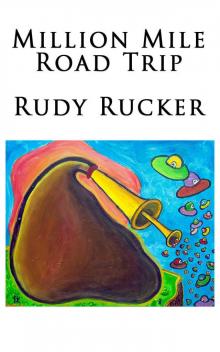 Million Mile Road Trip
Million Mile Road Trip Good Night, Moon
Good Night, Moon Transreal Trilogy: Secret of Life, White Light, Saucer Wisdom
Transreal Trilogy: Secret of Life, White Light, Saucer Wisdom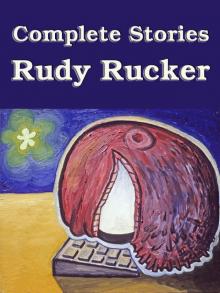 Complete Stories
Complete Stories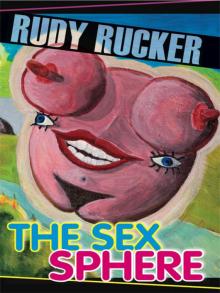 The Sex Sphere
The Sex Sphere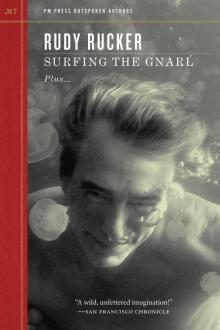 Surfing the Gnarl
Surfing the Gnarl Software
Software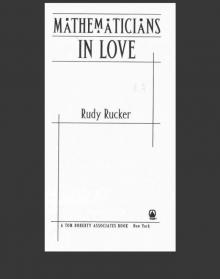 Mathematicians in Love
Mathematicians in Love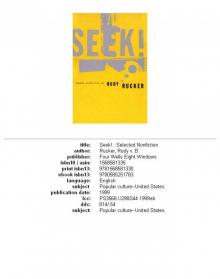 Seek!: Selected Nonfiction
Seek!: Selected Nonfiction The Secret of Life
The Secret of Life The Hacker and the Ants
The Hacker and the Ants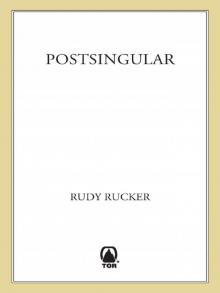 Postsingular
Postsingular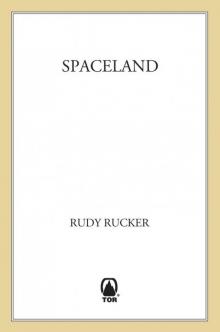 Spaceland
Spaceland Transreal Cyberpunk
Transreal Cyberpunk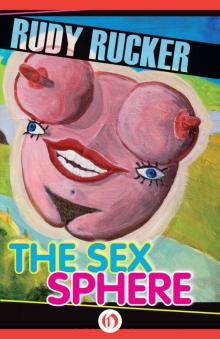 Sex Sphere
Sex Sphere Spacetime Donuts
Spacetime Donuts Freeware
Freeware The Ware Tetralogy
The Ware Tetralogy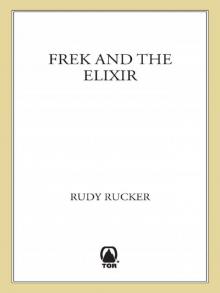 Frek and the Elixir
Frek and the Elixir Junk DNA
Junk DNA White Light (Axoplasm Books)
White Light (Axoplasm Books)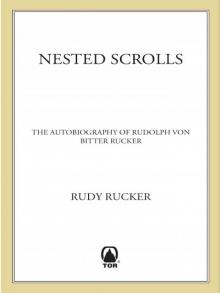 Nested Scrolls
Nested Scrolls Inside Out
Inside Out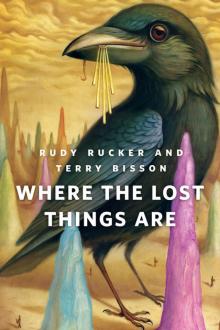 Where the Lost Things Are
Where the Lost Things Are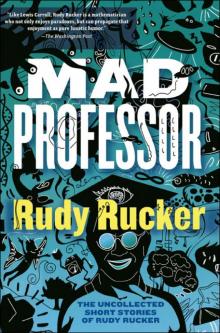 Mad Professor
Mad Professor As Above, So Below
As Above, So Below Realware
Realware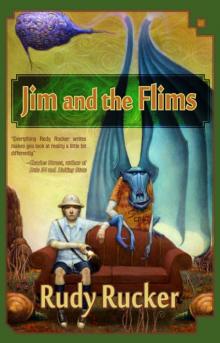 Jim and the Flims
Jim and the Flims Master of Space and Time
Master of Space and Time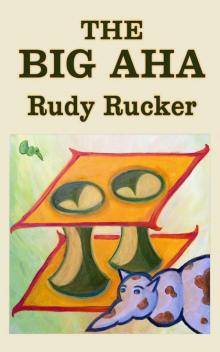 The Big Aha
The Big Aha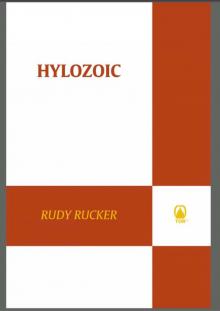 Hylozoic
Hylozoic